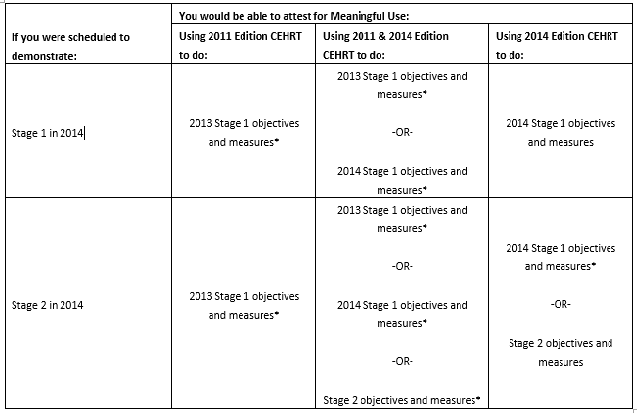 The Other Shoe Droppeth
The Other Shoe Droppeth
By Jim Tate, EMR Advocate
Meaningful Use Audit Expert
Twitter: @JimTate, eMail: audits@emradvocate.com
We’ve been waiting for it to drop since late July and it finally hit the floor just as the three-day end of summer weekend was kicking off.
The new CMS final ruling that was published on August 29, 2014 allows an end run around some of the challenges of receiving an EHR incentive in 2014. Don’t have 2014 Edition software? No problem, just use the old tattered and worn version from last year. Having trouble hitting the Stage 2 marks? No problem, just back pedal to Stage 1 and all is well. Now there are a few details in the fine print that should not be overlooked, and do not provide a poultice for every meaningful use (MU) ache and pain, but sometimes you can’t get what you want.
There are lots of folks, especially in the hospital domain, who are not reaching quite yet for the champagne. I’m learning to play the hand that is dealt so let’s take a look at the cards. First, let’s take a quick glance at the new rules for achieving MU in 2014 courtesy of CMS.
CEHRT SYSTEMS AVAILABLE FOR USE IN 2014
*Only providers that could not fully implement 2014 Edition CEHRT for the EHR reporting period in 2014 due to delays in 2014 Edition CEHRT availability.
Take a close look at the tiny print at the bottom of the chart. Yes, the one with the asterisk that says “Only providers that could not fully implement 2014 Edition CEHRT for the EHR reporting period in 2014 due to delays in 2014 Edition CEHRT availability.” The ability to fall back to 2011 Edition software or slide from Stage 2 to Stage1 is not solely based on choice but on availability of 2014 Edition. So, the question is, “What is meant by “2014 Edition CEHRT availability”? I have heard from many providers who are concerned that if their vendor is 2014 Edition certified they will not be able to take advantage of this option. However this is not the case. CMS in the final ruling released last week expanded on the definition of “availability” to include whether a provider is able to “fully implement” the 2014 version. “Full implementation” as described in the new Final Rule includes such items as: “staff training, system testing and workflow revisions”, “update and integration”, and “software patches or workflow changes”. To me that is a liberal, and most welcome, CMS interpretation.
Now for some of the interesting details:
- If a Medicaid eligible professional is in the first year of the program in 2014 and needs to meet the requirements for adopting, implementing, or upgrading CEHRT, they must use 2014 CEHRT. No wiggle room here to try and breathe life into 2011 technology.
- Eligible hospitals or professionals will not have any luck with 2011 Edition software in the 2015 MU year. That begins in less that a month for hospitals and in four months for the EPs.
- Some providers may fall into a gap between 2011 and 2014 Edition software. They might have achieved MU in 2013 but their software has been modified to the point that the version they are now using in no longer certified and they haven’t, for whatever reason, moved to 2014 software. They appear to be out of luck.
- Vendors will be scrambling to provide guidance to users on a case-by-case basis. Decisions will need to be made quickly to stay the course for 2014 MU or take advantage of a more appropriate option offered in the final ruling.
For more details check out the 2014 CEHRT Rule: Quick Guide and the CEHRT Flexibility Decision Tool.
Jim Tate is known as the most experienced authority on the CMS Meaningful Use (MU) audit and appeal process. His unique combination of skills has brought successful outcomes to hospitals at risk of having their CMS EHR incentives recouped. He led the first appeal challenge in the nation for a client hospital that had received a negative audit determination. That appeal was decided in favor of the hospital. He has also been successful in leading the effort to reverse a failed appeal, even after the hospital had received notification of the failure with the statement, “This decision is final and not subject to further appeal”. That “final” decision was reversed in less than a week. If you are a hospital with questions or concerns about the meaningful use audit process, contact him at: audits@emradvocate.com. This post was original published on MeaningfulUseAudits.com.

